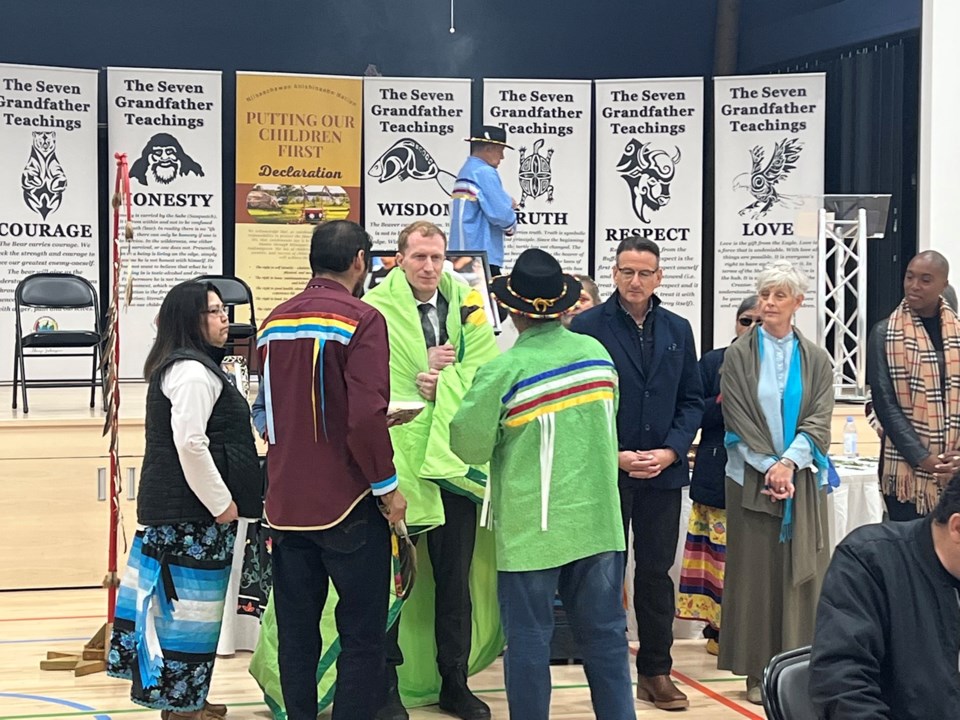The Niisaachewan Anishinaabe Nation has reached a settlement worth roughly $83 million with the provincial and federal governments in a historic flooding claim.
The finalization of the settlement was marked by a ceremony on Wednesday in the First Nation, located just north of Kenora, that also included apologies from elected officials.
Canada will pay $63,243,003 and Ontario will contribute $19,839,609, bringing the total compensation to $83,082,612, the federal government reported.
The compensation and apologies addressed the impacts of flooding caused by the Rollerway and Norman dams, built in the late 1800s.
The construction of the dams caused changes in water levels on the Winnipeg River, resulting in "the flooding of portions of the Reserve from 1887 to the present without proper authorization or payment of compensation," the federal governent said.
The claims process started over 20 years ago when Niisaachewan submitted a claim to Ontario on December 2, 2000, and to Canada on January 2, 2001.
Chief Lorraine Cobiness of the Niisaachewan Anishinaabe Nation said Wednesday's ceremonies “were so sacred and beautiful and inclusive and hopeful."
"The apologies that my people heard were so significant that it brought them right to the core, where emotions were raw," she said.
Cobiness credited the willingness of both levels of government to come to the table and "[allow] us to get to this point."
She said her people were shocked when they heard federal minister for Crown-Indigenous Relations Marc Miller apologize in Anishnaabemowin, the language of their community.
“My people… were smiling, they were like 'what the heck?' and we understood him and it was beautiful.”
Miller said on his Twitter feed he presented the apology in that language out of respect for the community.
Cobiness said the apology from provincial Minister of Indigenous Affairs and Kenora-Rainy River MPP Greg Rickford was also touching.
“That’s what [my people] needed to hear to be able to put some of that stuff aside and be able to move forward.”
While the apologies were appreciated, Cobiness questions why the process has taken so long.
"You look across Turtle Island, you see other elements of different types of grievances being settled within a year," she said. "We always haven’t had the best relationships with both levels of government and we're starting to re-establish those. Honestly, I think it’s the legislation that goes along with specific claims and everything [that makes it] so time consuming."
Still, she said, "Our people always say 'Take your time to do it right.' And if you need to gather that knowledge, that history, it takes time because you open up so much emotions and devastation at times when you start talking about these issues, and it takes time to go through them."
Calling the settlement "substantial," Cobiness said it’s about setting up future generations.
“That’s what is most important to my people, was to be able to take care our kids here, our grandkids and the kids that are still yet to come, so they're in a position where they are so independent and that they can think for themselves.“
Cobiness said what she’s learned from her people is that we can’t change what has already happened, but we can change the relationship moving forward.
“The apologies from both ministers really struck a chord with them. That was at the end of the day what they wanted to hear, what they needed to hear in order to say okay,” she said. “Now let’s set the stage for a new relationship, a better relationship and a commitment to changing systems that don’t work. And we could be part of those solutions.”
The federal and provincial governments reached a flood claim settlement with Mitaanjigamiing First Nation in August.
